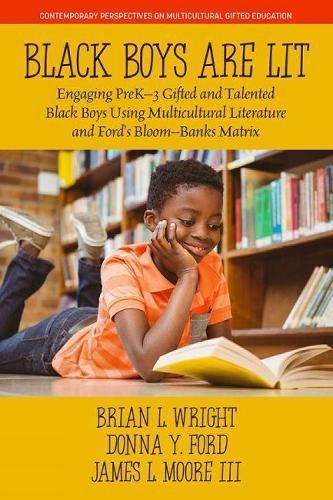Readings Newsletter
Become a Readings Member to make your shopping experience even easier.
Sign in or sign up for free!






This title is printed to order. This book may have been self-published. If so, we cannot guarantee the quality of the content. In the main most books will have gone through the editing process however some may not. We therefore suggest that you be aware of this before ordering this book. If in doubt check either the author or publisher’s details as we are unable to accept any returns unless they are faulty. Please contact us if you have any questions.
This book of matrices with Black boys as the main character is designed to help gifted and talented education teachers leverage Black boys’ identities to inform and shape how they plan and deliver curriculum and instruction and manage the multicultural, democratic, and culturally responsive classroom. Ford and colleagues (2005) spoke to the notion of and need for ‘self-reflective instruction.’ We argue that all teachers must want to and learn how to legitimize the everyday experiences that are learned and cultivated in the homes and communities of Black boys, and how these experiences shape their self-identities and contribute to agency (Wright, Counsell, & Tate 2015). We, therefore, advocate for the rethinking of literacies by repositioning White-centered texts that often reflect and represent power and privilege toward centering the brilliance of Black identities of Black children in general, Black boys in particular.
Black boys (of all ages) want to and need to physically see positive images of themselves in books reflected at them. This representation, we argue, has the potential to become an example of a compelling counter-narrative to the history of the all-White world (Larrick, 1965) of children’s books that only presented Black characters as objects of ridicule and generally inferior beings (Sims Bishop 2012, p. 6). When Black boys see themselves portrayed visually, textually, and realistically in children’s books, vital messages of recognition, value, affirmation, and validation are conveyed. Recognition of the sociocultural contexts in which they live is celebrated.
Books for and about Black boys must be rigorous, authentic, multicultural, and developmentally appropriate to allow them to synthesize what they have read, heard, and seen during literacy instruction in authentic and meaningful ways. Multicultural books must introduce children to information about the values of justice, fairness, and equity. Developmentally appropriate books should vary with and adapt to the age, experience, and interests of gifted and talented Black boys to allow them the opportunity to demonstrate critical thinking, textual analysis skills and convey conceptual knowledge. These stories must expose Black boys to culturally relevant counter stories – stories that counteract the dominant discourse that has primarily depicted Black boys as at risk versus placed at risk; without hope versus hopeful; or out of control and dangerous (Tatum, 2005, p. 28) versus developing self-control like all other children (Wright et al., 2018).
$9.00 standard shipping within Australia
FREE standard shipping within Australia for orders over $100.00
Express & International shipping calculated at checkout
This title is printed to order. This book may have been self-published. If so, we cannot guarantee the quality of the content. In the main most books will have gone through the editing process however some may not. We therefore suggest that you be aware of this before ordering this book. If in doubt check either the author or publisher’s details as we are unable to accept any returns unless they are faulty. Please contact us if you have any questions.
This book of matrices with Black boys as the main character is designed to help gifted and talented education teachers leverage Black boys’ identities to inform and shape how they plan and deliver curriculum and instruction and manage the multicultural, democratic, and culturally responsive classroom. Ford and colleagues (2005) spoke to the notion of and need for ‘self-reflective instruction.’ We argue that all teachers must want to and learn how to legitimize the everyday experiences that are learned and cultivated in the homes and communities of Black boys, and how these experiences shape their self-identities and contribute to agency (Wright, Counsell, & Tate 2015). We, therefore, advocate for the rethinking of literacies by repositioning White-centered texts that often reflect and represent power and privilege toward centering the brilliance of Black identities of Black children in general, Black boys in particular.
Black boys (of all ages) want to and need to physically see positive images of themselves in books reflected at them. This representation, we argue, has the potential to become an example of a compelling counter-narrative to the history of the all-White world (Larrick, 1965) of children’s books that only presented Black characters as objects of ridicule and generally inferior beings (Sims Bishop 2012, p. 6). When Black boys see themselves portrayed visually, textually, and realistically in children’s books, vital messages of recognition, value, affirmation, and validation are conveyed. Recognition of the sociocultural contexts in which they live is celebrated.
Books for and about Black boys must be rigorous, authentic, multicultural, and developmentally appropriate to allow them to synthesize what they have read, heard, and seen during literacy instruction in authentic and meaningful ways. Multicultural books must introduce children to information about the values of justice, fairness, and equity. Developmentally appropriate books should vary with and adapt to the age, experience, and interests of gifted and talented Black boys to allow them the opportunity to demonstrate critical thinking, textual analysis skills and convey conceptual knowledge. These stories must expose Black boys to culturally relevant counter stories – stories that counteract the dominant discourse that has primarily depicted Black boys as at risk versus placed at risk; without hope versus hopeful; or out of control and dangerous (Tatum, 2005, p. 28) versus developing self-control like all other children (Wright et al., 2018).